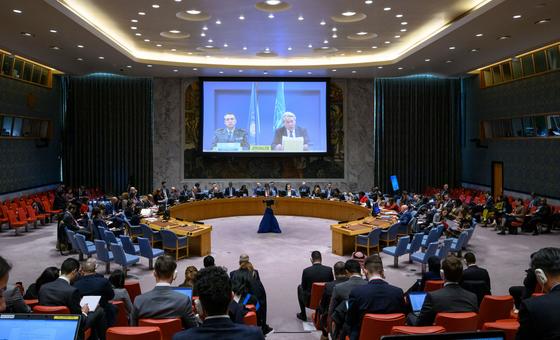After intense negotiations all week behind closed doors at the 15-member Security Council, ambassadors are still negotiating over a draft resolution penned by the United Arab Emirates which calls for an “urgent suspension” of the conflict to allow safe and unhindered delivery of aid to stricken civilians in the Gaza Strip. The Council is expected to meet on the crisis later on Thursday and we’ll bring you live coverage here…
The last draft was vetoed by the US on 8 December, which was quickly followed by action in the UN General Assembly four days later, when Member States voted by an overwhelming majority in favour of an immediate humanitarian ceasefire, through a non-binding resolution.
The Emergency Special Session of the Assembly resumed and then adjourned on Wednesday with dozens of countries making statements on the crisis.

A boy cycles through the heavily bombarded Asqola neighbourhood of Gaza City.
The Council has been negotiating throughout the week to find language which will avoid a further US veto, having first introduced a draft which called for a “cessation of hostilities”, which now calls for a “suspension” of fighting, to vastly increase access for lifesaving aid.
The US argued on Tuesday and in previous deadlocked sessions that any resolution must condemn the Hamas extremist group’s terror attacks of 7 October which sparked this deadly and unprecedented surge in the Palestine-Israel conflict, and which led to around 1,200 deaths in southern Israel and the capture of more than 200 hostages by extremists, dozens of whom remain captive in Gaza.
Some countries critical of Israel’s offensive have argued in response that any resolution condemning Hamas, must also condemn the Israeli occupation and the thousands of civilian deaths resulting from Israel’s military action since 7 October.
According to media reports, a further sticking point for diplomats negotiating the draft resolution has been the setting up of a UN monitoring mechanism which would be responsible for assessing the effectiveness of aid delivery at scale, independent of either Israeli or Hamas authorities in Gaza.
Situation in Gaza
Latest casualty figures from authorities in Gaza report around 20,000 civilian deaths since the Israeli retaliatory bombardment and offensive began, most of them women and children.
As of Thursday there are no functioning hospitals left in the north of the enclave and injured parents stranded in facilities are “waiting to die” there, according to the UN health agency WHO.
Tuesday’s meeting
On Tuesday as the Council met to discuss the crisis in the Middle East in a scheduled debate, the UN Special Envoy for the peace process said the whole humanitarian system was “on the brink” of collapse, and also voiced deep concern at the deteriorating situation for Palestinians in the occupied West Bank.
“I reiterate that security forces must exercise maximum restraint and use lethal fore only when it is strictly unavoidable to protect life,” Tor Wennesland stressed.
Draft resolution: Key points
- Demands parties to the conflict “allow, facilitate and enable the immediate, safe and unhindered delivery of humanitarian assistance” at scale, to the Palestinian population of Gaza.
- Calls for the “urgent suspension of hostilities” to allow safe and unhindered access.
- The resolution cites “deep concern at the dire and rapidly deteriorating humanitarian situation” in Gaza and its “grave impact” on civilians there.
- Reaffirms the Council’s “strong concern for the disproportionate effect” the conflict is having on women and children. It stresses the obligation to respect and protect humanitarian relief and medical staff.
- Takes note of the reopening of the Karem Abu Salem or Kerem Shalom crossing from Israel to speed up delivery of aid, and demands the parties allow the use of all land, sea and air routes to provide an increased flow of aid.
- Requests the UN chief sets up a monitoring mechanism with the necessary staff and equipment “to exclusively monitor all humanitarian relief consignments”, to speed up delivery. This will be independent of all parties to the conflict and be in effect for one year.
- Demands the “immediate and unconditional release of all hostages” providing for their medical needs while still captive and “firmly condemns” all violations of international humanitarian law including indiscriminate attacks against civilians “and all acts of terrorism.”
- Notes UN facilities are protected under humanitarian law and “rejects forced displacement of the civilian population”. It demands combatants ensure the safety and security of all UN and associated personnel.
-
Reiterates the Council’s “unwavering commitment to the vision of the two-State solution”, stressing the importance of unifying the West Bank and Gaza under the Palestinian Authority.

